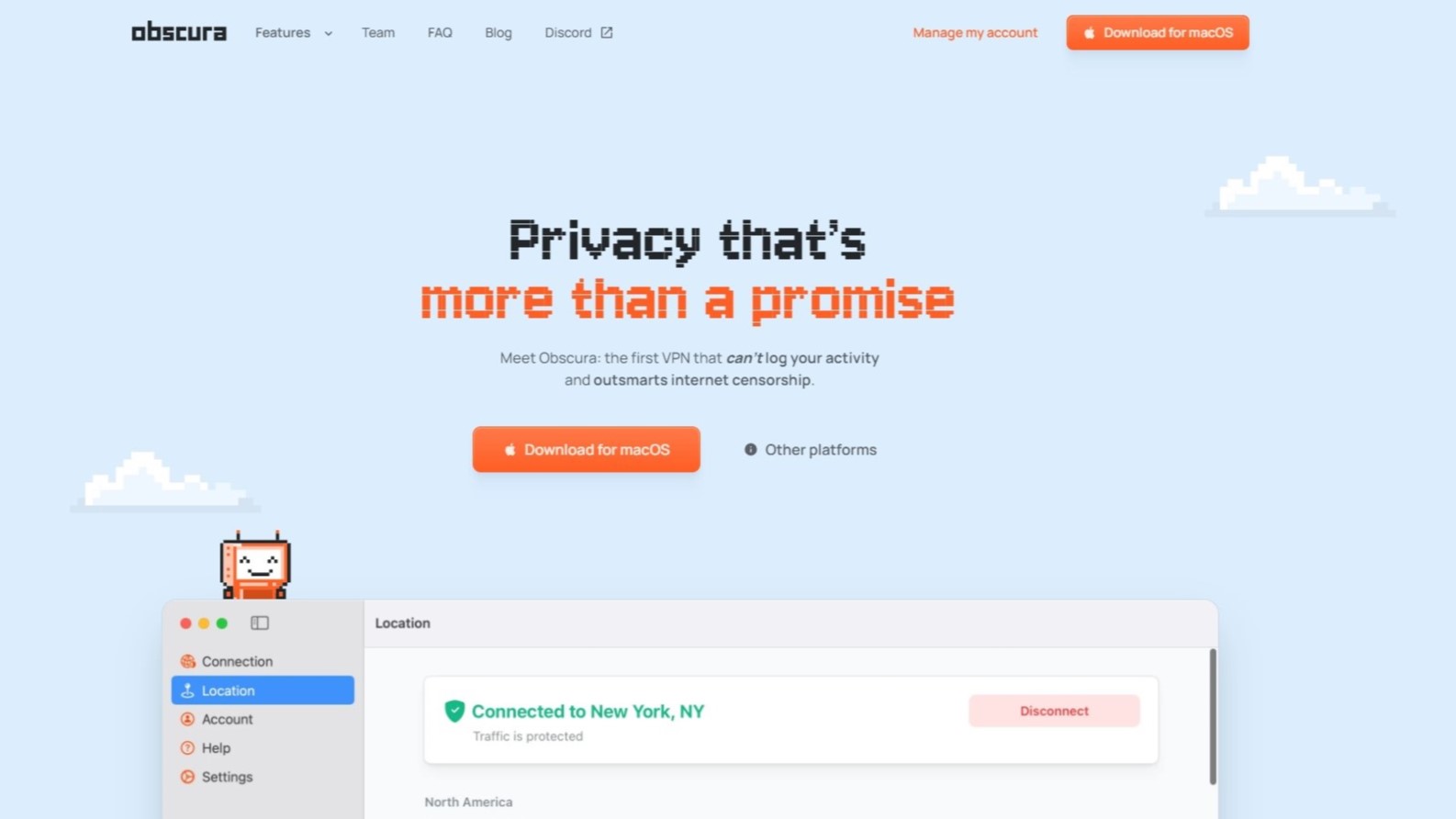Obscura VPN promises to “set the standard for the next-generation of VPNs”
The provider uses two-party exit nodes and a new censorship-resistant protocol

Year in and year out, increasingly more people worldwide turn to VPN software to claim back their privacy online and bypass internet geo-restrictions. Not all services are made equal, though. Now, Obscura VPN, a new provider on the market, has thrown a challenge to the whole industry and promises to "set the standard for the next generation of VPNs."
Obscura VPN officially launched on February 11, 2025, and essentially vows to do two things better than its competitors: to be "private by design" and "outsmart internet restrictions."
The VPN is only available for macOS at the time of writing. Support for other platforms is set to be added in the future.
Two VPNs, better than one?
According to Obscura VPN's founder, Carl Dong, today's VPN industry comes with some considerable flaws, the biggest being around providers' trust.
In a blogpost he said: "Fundamentally, the biggest flaw of existing VPN companies is that they act as your primary man-in-the-middle – seeing both your personal info (connecting IP, email, billing address, etc.) and your browsing history."
In Dong's opinion, not even no-log VPNs are a complete solution as, even a provider that keeps true to its promise, "can suffer a security breach and be compromised."
We asked Dong for more clarifications on these points as well as for his take on independent no-log audits but are still awaiting a response at the time of publication.
What's important to know for now is that Obscura VPN decided to take a different route to be more "private by design." VPN traffic gets rerouted through two different hops. Yet, unlike traditional multi-hop VPNs, each of these servers are managed independently by two different VPN providers.
Today we are announcing a partnership with Obscura VPN, a newly launched two-party VPN service that uses our WireGuard VPN servers as its “exit hop”. Read more here: https://t.co/BxWn9hOuh5February 11, 2025
To do so, Obscura VPN has partnered with one of the most secure VPNs on the market, Mullvad VPN.
Obscura's servers act as the entry hop that encrypts your internet connection via the WireGuard protocol for later relaying it to Mullvad-operated exit servers. It's then the second VPN provider (Mullvad) that technically connects you to the internet.
"This splits 'who you are' from 'what you do,' meaning neither party can tie your identity to your browsing," Dong explains.
Obscura VPN claims, in fact, that it can never decrypt your traffic. On its side, Mullvad should not be able to see your personal information linked with your account, either.
Additionally, Obscura VPN doesn't require your name, email, phone address, or any credit card info to sign up, reducing the amount of users' data collected.
A new censorship-resistant tech
As previously mentioned, Obscura VPN also promises to be better than its competitors in bypassing censorship and evading VPN blocks. To achieve that, it employs QUIC (Quick UDP Internet Connections), a newer internet protocol designed for maximum security and speed.
According to Dong, QUIC is better than current VPN obfuscation technologies as it blends with normal internet traffic while avoiding performance issues that might affect TCP (transmission control protocol) connections.
Beyond the technicalities, many VPN providers keep investing in their censorship-resistant features to stay ahead of the game against ever-sophisticated censors' tactics.
NordVPN, for example, has recently released its new censorship-resistant NordWhisper protocol that uses web tunnel technology designed to mimic normal web traffic. Proton VPN also unveiled a few major updates to its service over the summer to double down on its fight against censorship, including expanding support for its very own Stealth VPN protocol on Windows.
While only time will tell if Obscura VPN can really outsmart tough censorship better than its competitors, it's definitely interesting to see yet another solution developing in this space.
Today is the day: Obscura VPN is NOW AVAILABLE!@obscuravpn is the first VPN that:- CAN'T log your activity by design- Outsmarts network filtersWe believe Obscura sets the standard for a new generation of VPNs, and hope you’ll check it out!👇 Links + more in thread pic.twitter.com/biQBwXhAvmFebruary 11, 2025
Currently, Obscura VPN only offers its provider as a Mac VPN – this means if you're using different devices you'll need to wait a bit longer before you can test it out.
The server network is quite slim, too, when compared to other VPN providers. These include a few locations between Canada and the US, some European countries (France, Italy, Germany, Netherlands, Spain, Switzerland, Ukraine, and the UK), and less than a handful in Asia (Japan, Singapore, and Turkey). Again, the team is said to be working to add more locations soon.
You can subscribe at a discounted rate right now of $6 per month, instead of the regular cost of $8.
While it's too early to say if Obscura will eventually gain its spot among the best VPN apps, it's worth mentioning that the software is fully open-source. This means that anyone with some technical knowledge will be able to lift up the hood and take a look at its code to see if it really does what it claims to.

Chiara is a multimedia journalist committed to covering stories to help promote the rights and denounce the abuses of the digital side of life – wherever cybersecurity, markets, and politics tangle up. She believes an open, uncensored, and private internet is a basic human need and wants to use her knowledge of VPNs to help readers take back control. She writes news, interviews, and analysis on data privacy, online censorship, digital rights, tech policies, and security software, with a special focus on VPNs, for TechRadar and TechRadar Pro. Got a story, tip-off, or something tech-interesting to say? Reach out to chiara.castro@futurenet.com
You must confirm your public display name before commenting
Please logout and then login again, you will then be prompted to enter your display name.